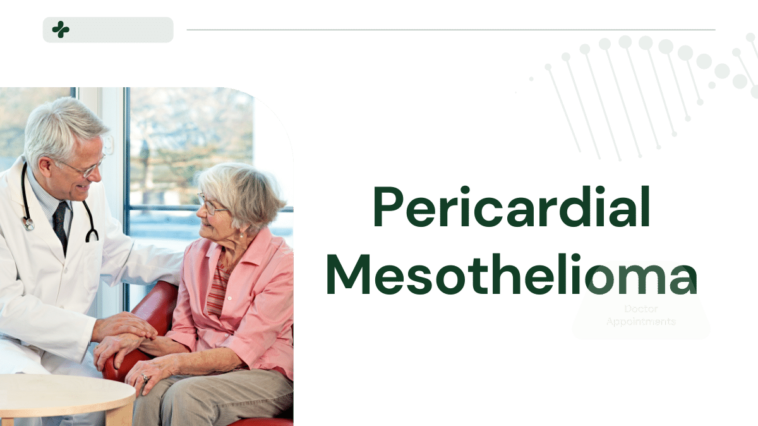The mesothelium is a membrane that is composed of a single layer of flat cells. This layer of tissue is thin, and it helps in covering many of our internal organs. Cancer that is developed in this layer is known as Mesothelioma. This cancer mainly affects the lining of the chest wall and the lungs.
Types of Mesothelioma
Pleural Mesothelioma
The name suggests, is the type of cancer affecting the protective lining of the lung, the pleura. Approximately 75% of the total Mesothelioma diagnosis is of Pleural Mesothelioma.
Peritoneal Mesothelioma
This cancer affects the lining of the abdomen, the peritoneum. Approximately 20% of the total Mesothelioma diagnosis is of peritoneal Mesothelioma.
Pericardial Mesothelioma
Pericardial Mesothelioma occurs in the lining of the heart, the pericardium. This is the rarest form of Mesothelioma, and only 1% of the total Mesothelioma diagnosis is of pericardial Mesothelioma.
What Is Pericardial Mesothelioma?
More men are prone to this cancer than women. According to the survey, Pericardial Mesothelioma is mainly diagnosed in people aged between 50 and 70 and is developed over a long time.
Also, most of the time, this cancer is detected in its later stages. Since this disease has a relatively poor prognosis, a lot of research is going on this disease and researchers are trying to find more treatments and remedies for this type of cancer.
Pericardial Mesothelioma Causes
The leading cause of this cancer is asbestos exposure. When the asbestos fibers reach the heart, it may cause this type of cancer as the asbestos fibers may place themselves in the membrane surrounding the heart. Asbestos is a mineral that is common in industrial and household products.
Many people are at risk of being exposed to this dangerous mineral. Some examples include industrial workers, construction workers, shipbuilders, etc.
Symptoms of Pericardial Mesothelioma
Symptoms of Pericardial Mesothelioma may vary from person to person. Some of the common symptoms include,
- Chest pain
- Persistent coughing
- Shortness of breath
- Heart palpitations
- Fluid in the pericardial space
- Dyspnea
Sometimes Pericardial Mesothelioma’s symptoms may be confused with that of other ailments related to the heart.
Pericardial Mesothelioma Diagnosis
Because of its rarity, the diagnosis is difficult. If a physician doubts Pericardial Mesothelioma, some image tests such as X-rays, scans, and MRI tests are performed.
If something shows up in these images or a tumor is located, the doctors perform a biopsy. In the biopsy, tissues or fluids are removed from the area that is affected. By performing several tests on the fluids, the doctor can confirm whether it is Pericardial Mesothelioma or not.
Some examples of tests that are performed for the diagnosis of Pericardial Mesothelioma include,
Echocardiogram
This is a device that uses sound waves to test and detect heart function. If there is pericardial thinking, then the regular functioning of the heart will be impaired, and the Echocardiogram may detect this.
With the help of an Echocardiogram, the doctor will hear the beating of the patient’s heart and the pumping blood. Sometimes it may happen that a patient is experiencing chest pain because the heart cannot pump the blood properly.
Effusion Cytology
Fluids from around the heart, the pericardium, are extracted by the doctors to examine it and find the traces of Mesothelioma. This is known as pericardiocentesis.
Pericardioscopy
Here the doctor inserts a tube attached to a camera near the heart by making a small incision in the skin.
Pericardial Mesothelioma Treatment
Pericardial mesothelioma treatment is difficult and limited as the tumor is very close to the heart. Some of the treatments that are available include;
Pericardiectomy Surgery
A Pericardiectomy Surgery means removing all of the pericardium or only some part of it. This helps in maintaining the pressure on the heart so that the heart can function properly. This surgery is quite risky as the operation needs to be done very near the heart, and there might be some risk of damage to the heart. But if this surgery is not performed, the cancerous pericardium may affect the normal functioning of the heart.
After removing the pericardium, the lining of the heart is replaced by an artificial material known as Gore-tex, a membrane made up of breathable fabric.
Pericardiocentesis
In this treatment procedure of Pericardial Mesothelioma, doctors relieve the pressure on the pericardium. This is mainly done by first locating the affected area with the help of echocardiography and then inserting the needle there to drain the fluid.
Chemotherapy
This is one of the most common and most effective treatment procedures for many types of cancer. Research is being done to study the effects and causes of Pericardial Mesothelioma and its possible chemotherapy treatment. According to one of the studies, a combination of cisplatin, gemcitabine, and vinorelbine was able to slow the progression of Mesothelioma.
Pericardial Mesothelioma Prevention
The only way in which we can try to prevent the occurrence of Pericardial Mesothelioma or any other type of Mesothelioma is by avoiding getting exposed to asbestos.
According to the US National Institute for Occupational Safety and Health, the minimum exposure to asbestos that can be maintained is 0.1 asbestos fiber per cubic centimeter.
Life Expectancy of Pericardial Mesothelioma Patients
The life expectancy of these patients depends on how early this disease is diagnosed. Usually, it may range from 12 to 21 months. Moreover, survival also depends upon the age, gender, health, the type of cancer cells detected, and the most important, the patient’s willpower.




